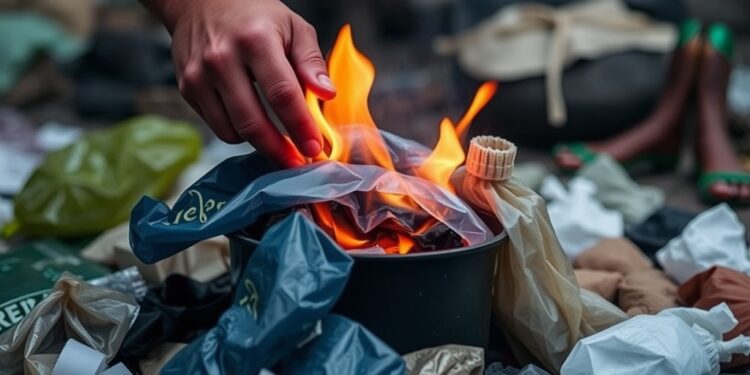Study Reveals Growing Crisis: The Dangers of Burning Plastic for Cooking and Heating
Study Reveals Growing Crisis: The Dangers of Burning Plastic for Cooking and Heating

A recent study led by researchers at Curtin University has shed light on a pressing and hazardous practice that is escalating in developing nations: the burning of plastic as a household fuel. Published in the esteemed journal Nature Cities, this research highlights a critical situation emerging from the dual challenges of inadequate access to clean energy sources and rampant urbanization. Households in countries across Africa, Asia, and Latin America, facing a dire shortage of traditional fuels like gas and electricity, are increasingly resorting to burning available plastic waste for cooking and heating. This practice, however, poses severe environmental and health risks that warrant immediate attention and action.
The study underscores a grim reality: many communities in developing regions are trapped in a cycle of poverty, which limits their access to cleaner energy alternatives. The increasing costs associated with cleaner fuels have left numerous households unable to transition to safer options. In densely populated urban areas, where traditional fuel sources such as timber and charcoal have become scarce due to deforestation and urban sprawl, plastic waste has become a ubiquitous substitute. This shift not only reveals the resourcefulness of these communities but also points to a critical oversight in addressing the underlying energy needs faced by millions.
Lead researcher Dr. Bishal Bharadwaj, affiliated with the Curtin Institute for Energy Transition, emphasizes the myriad health risks associated with this practice. Burning plastic is far from innocuous; it releases toxic substances including dioxins and heavy metals into the air. These pollutants can lead to a spectrum of health issues, some of which are particularly harmful to vulnerable populations, notably women and children. These demographics typically spend more time at home and thus face higher exposure levels. The adverse health outcomes extend beyond individual households, affecting entire neighborhoods and cities, demonstrating a dire need for comprehensive solutions to this burgeoning public health crisis.
The research further reveals alarming statistics, highlighting the prevalence of this issue. In a survey conducted among Nigerian households, 13 percent reported utilizing garbage, including plastic, as a cooking fuel. In Indonesia, environmental studies of soil and food samples have detected dangerous levels of toxins linked to the burning of plastic waste. These findings paint a concerning picture of the escalating public health hazards driven by this widespread practice. As urbanization accelerates, projections suggest that by 2050, two-thirds of the global population will reside in urban settings, many of which already struggle to deliver basic services such as waste management and access to clean energy.
With plastic consumption projected to triple by 2060, the potential for worsening inequality becomes a sobering reality. Unmanaged urban growth in developing countries is anticipated to exacerbate the challenges faced by communities relying on unsafe energy practices. As cities expand and poverty persists, the need for innovative, sustainable energy solutions becomes increasingly urgent. Dr. Bharadwaj argues that long-term, impactful interventions must be developed to address this complex issue, focusing on the provision of affordable alternatives and improved waste management systems.
Professor Peta Ashworth, Director of the Curtin Institute for Energy Transition, emphasizes the necessity for further research to ascertain the extent of the impact caused by burning plastic and to shape actionable solutions. The current landscape sees many governments failing to robustly address these questions, often because the problem is concentrated in marginalized areas, such as slums, that receive little attention from policymakers. Without targeted efforts, the cycle of poverty and pollution will remain unbroken, perpetuating a cycle of health risks and environmental degradation.
In considering potential solutions, researchers advocate for strategies that can deliver immediate benefits to the most affected populations. Subsidizing the cost of cleaner fuels is one avenue worth exploring, as it could potentially make these options more accessible for low-income families. Improved waste management systems are also essential to mitigate the accumulation of plastic waste in urban areas, thereby reducing the reliance on burning plastics. Educational campaigns aimed at raising awareness about the dangers of burning plastic—coupled with the promotion of innovative cooking technologies tailored for economically disadvantaged households—could pave the way for safer, healthier living conditions.
This study serves as a clarion call for immediate, concerted action to tackle the multidimensional challenges posed by the burning of plastics in developing nations. By engaging with local communities and leveraging global partnerships, it is possible to devise strategies that not only address the immediate health risks but also foster long-term sustainability and resilience in these vulnerable populations. With the right interventions, the birth of healthier urban environments can occur, breaking the vicious cycle of poverty and pollution that has ensnared so many.
Ultimately, the authors of this study underscore the urgency for improved governance and policy frameworks that prioritize energy access and environmental justice. Investing in research and development of alternative fuels, as well as integrating community-centric approaches, could transform the trajectory of countless lives. Challenging the status quo will require dedication and innovation, but the potential for a brighter, cleaner future is within reach. This research is pivotal in driving change and sparking dialogue around one of the most pressing issues of our time—a call to action that cannot be ignored.
With the stakes higher than ever, the dissemination of these findings should serve as both a warning and a beacon of hope. The intersection of health, environment, and social equity demands our attention, and as this research illuminates, the path forward requires commitment, creativity, and collaboration across sectors. The legacy left by our energy choices today will shape the landscape of tomorrow, and it is our collective responsibility to choose wisely.
In summary, the consumption of plastic as a household fuel reflects broader systemic issues of inequality and environmental degradation. This practice, emerging from necessity yet fraught with dangers, necessitates comprehensive strategies to ensure that communities are not only able to survive but thrive amidst challenges. The findings of this research must resonate with global audiences, prompting urgent discussions and actions to steer communities toward sustainable energy futures.
Subject of Research: People
Article Title: The use of plastic as a household fuel among the urban poor in the Global South
News Publication Date: 18-Feb-2025
Web References: Nature Cities
References: None
Image Credits: None
Keywords: Social sciences, Energy resources, Urban studies, Risk factors, Inequalities.
Escalating Algal Blooms in Major Global Lakes: A Two-Decade Overview
Next PostCutting-Edge Technology Monitors Student Engagement in Educational Games to Enhance Collaborative Learning
REDIMadrid and Ciena Collaborate to Launch Groundbreaking End-to-End Quantum Secure Data Transport Initiative







